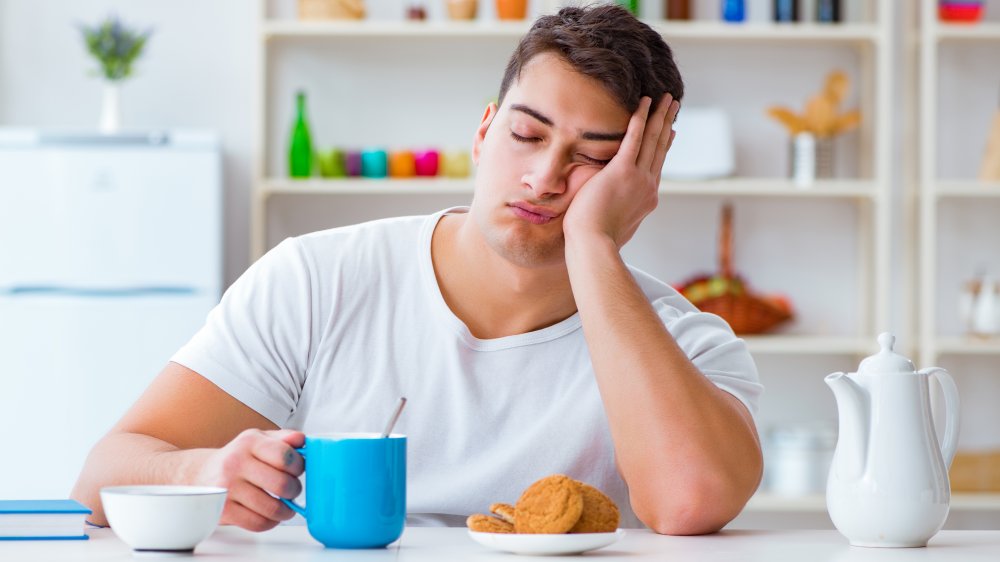This Is What Happens When You Drink Too Much Coffee
You have your first cup of coffee or two to wake you up in the morning, then a pick-me-up at the office to keep you awake during a meeting you've been dreading. Around 2 p.m., you grab a latte while catching up with some friends, and end dinner at your favorite Italian restaurant with shots of espresso (and a slice of tiramisu for dessert). Sound familiar? It's easy to unthinkingly fill your day with coffee, and then hours later find yourself suffering the consequences of too much caffeine.
According to the Mayo Clinic, the average adult can safely consume around 400 milligrams of caffeine per day, which is roughly the same amount you will find in four cups of brewed coffee. Regularly occurring symptoms of consuming too much caffeine include headaches, the inability to sleep, nervousness, irritability, and tremors, among other uncomfortable side effects. Drinking too much caffeine can also cause serious problems if you are taking certain medications or supplements, or if you have any underlying health issues.
Drinking too much coffee every day has been linked to serious physical ailments
Business Insider states that one very serious side effect from drinking too much coffee is liver damage. The outlet reports that according to the National Institute of Diabetes and Digestive and Kidney Diseases, drinking moderate amounts of coffee is actually good for your liver, but lasting damage can be caused if you have too much. The risk of developing liver damage increases if you are taking a lot of common over-the-counter medications to help manage pain. Livestrong supports this warning, sharing that, while drinking a moderate amount of caffeine each day does significantly lower your risk of developing chronic liver disease, a report published in 2007 found that drinking large amounts of caffeine daily was damaging to liver health.
Overconsumption of coffee can lead to other physical issues like stomach problems and heartburn. Healthy Women says this is because coffee is acidic and contains caffeine, which stimulates the gastrointestinal tract and causes the muscle at the end of your esophagus to relax. This often translates into an irritated stomach lining, cramps, or diarrhea, and stomach acid coming back up and causing heartburn. In a study published by the Journal of Neurogastroenterology and Motility in 2017 on the relationship between specific foods and recurring heartburn, 57 percent of all patients reported coffee as one of their frequent triggers, and 71 percent stated that it induced heartburn occasionally.
Drinking too much coffee can prevent you from sleeping properly
The National Sleep Foundation found that the stimulating effects of caffeine can last for several hours after you consume it, meaning that that post-dinner cup of joe might prevent you from getting a solid night's sleep. One study published by Nutrition in 2016 found that restless sleep caused by caffeine could even impact you the following day, leading you to drink even more coffee to battle the negative effects. It's easy to get trapped in a cycle of drinking too much coffee because you're tired, sleeping poorly because of how much coffee you drank, and then waking up still feeling tired, and drinking extra coffee the following day.
Drinking too much coffee each day is bad for your emotional and mental health too. Healthine reports that while many people drink coffee to feel more alert, too much coffee can lead to nervousness and increased anxiety. This is because caffeine works by blocking the effects of adenosine (a brain chemical that makes you tired), and triggering adrenaline (a hormone that increases energy). Drinking coffee can also cause you to breathe faster and raise your heart rate even when consumed in moderate amounts, which adds to the stress and anxiety you're feeling. This mentally-taxing combination of side effects is so commonly experienced that caffeine-induced anxiety disorder is listed in the Diagnostic and Statistical Manual of Mental Disorders, published by the American Psychiatric Association.


